Challenges in Hospitality, Leisure, and Travel during COVID-19
VerifiedAdded on 2022/07/06
|9
|2407
|88
Essay
AI Summary
This essay examines the significant challenges that the hospitality, leisure, and travel industries faced during the COVID-19 pandemic. It explores the positive and negative impacts of the pandemic, including travel restrictions, economic downturns, and shifts in consumer behavior. The essay discusses the importance of the tourism and hotel sectors and how they were affected by the virus, with a focus on the decline in demand for services, job losses, and the need for government intervention. It also highlights the potential for recovery through marketing strategies, price flexibility, and flexible cancellation policies. The essay concludes by emphasizing the profound effects of COVID-19 on the hospitality, leisure, and travel industries, the need for adaptation, and the importance of government support for the sector to recover from the crisis.
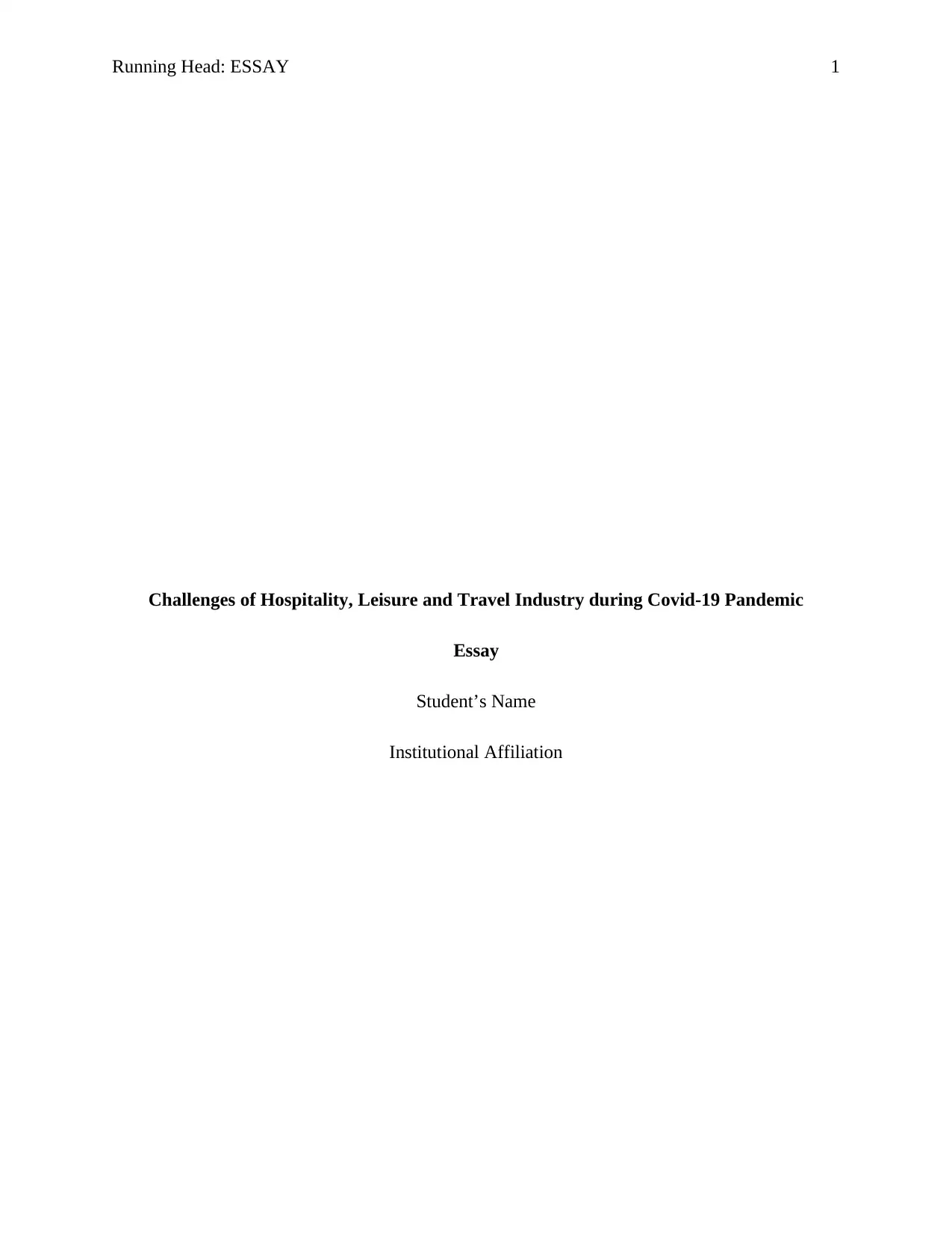
Running Head: ESSAY 1
Challenges of Hospitality, Leisure and Travel Industry during Covid-19 Pandemic
Essay
Student’s Name
Institutional Affiliation
Challenges of Hospitality, Leisure and Travel Industry during Covid-19 Pandemic
Essay
Student’s Name
Institutional Affiliation
Paraphrase This Document
Need a fresh take? Get an instant paraphrase of this document with our AI Paraphraser
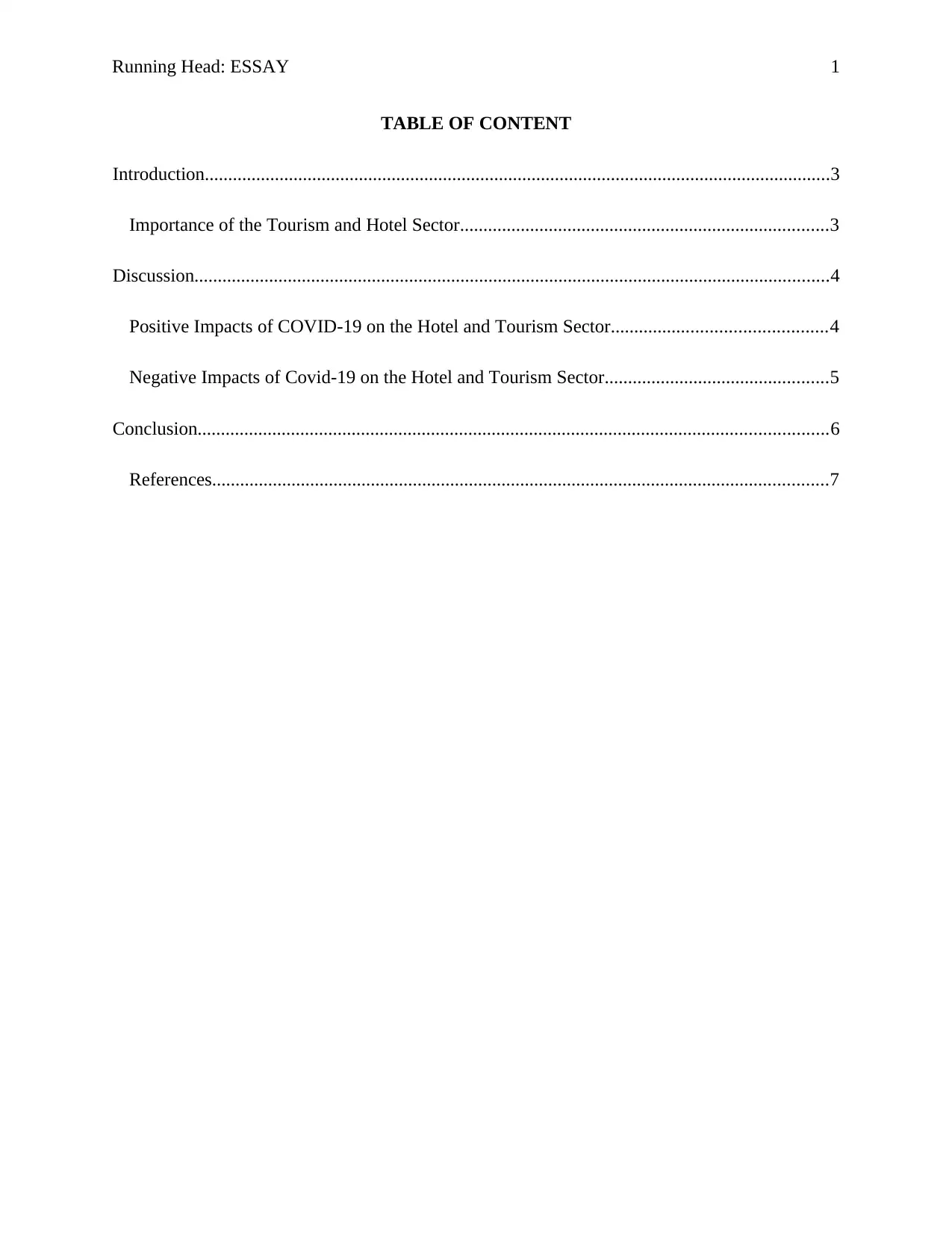
Running Head: ESSAY 1
TABLE OF CONTENT
Introduction......................................................................................................................................3
Importance of the Tourism and Hotel Sector...............................................................................3
Discussion........................................................................................................................................4
Positive Impacts of COVID-19 on the Hotel and Tourism Sector..............................................4
Negative Impacts of Covid-19 on the Hotel and Tourism Sector................................................5
Conclusion.......................................................................................................................................6
References....................................................................................................................................7
TABLE OF CONTENT
Introduction......................................................................................................................................3
Importance of the Tourism and Hotel Sector...............................................................................3
Discussion........................................................................................................................................4
Positive Impacts of COVID-19 on the Hotel and Tourism Sector..............................................4
Negative Impacts of Covid-19 on the Hotel and Tourism Sector................................................5
Conclusion.......................................................................................................................................6
References....................................................................................................................................7
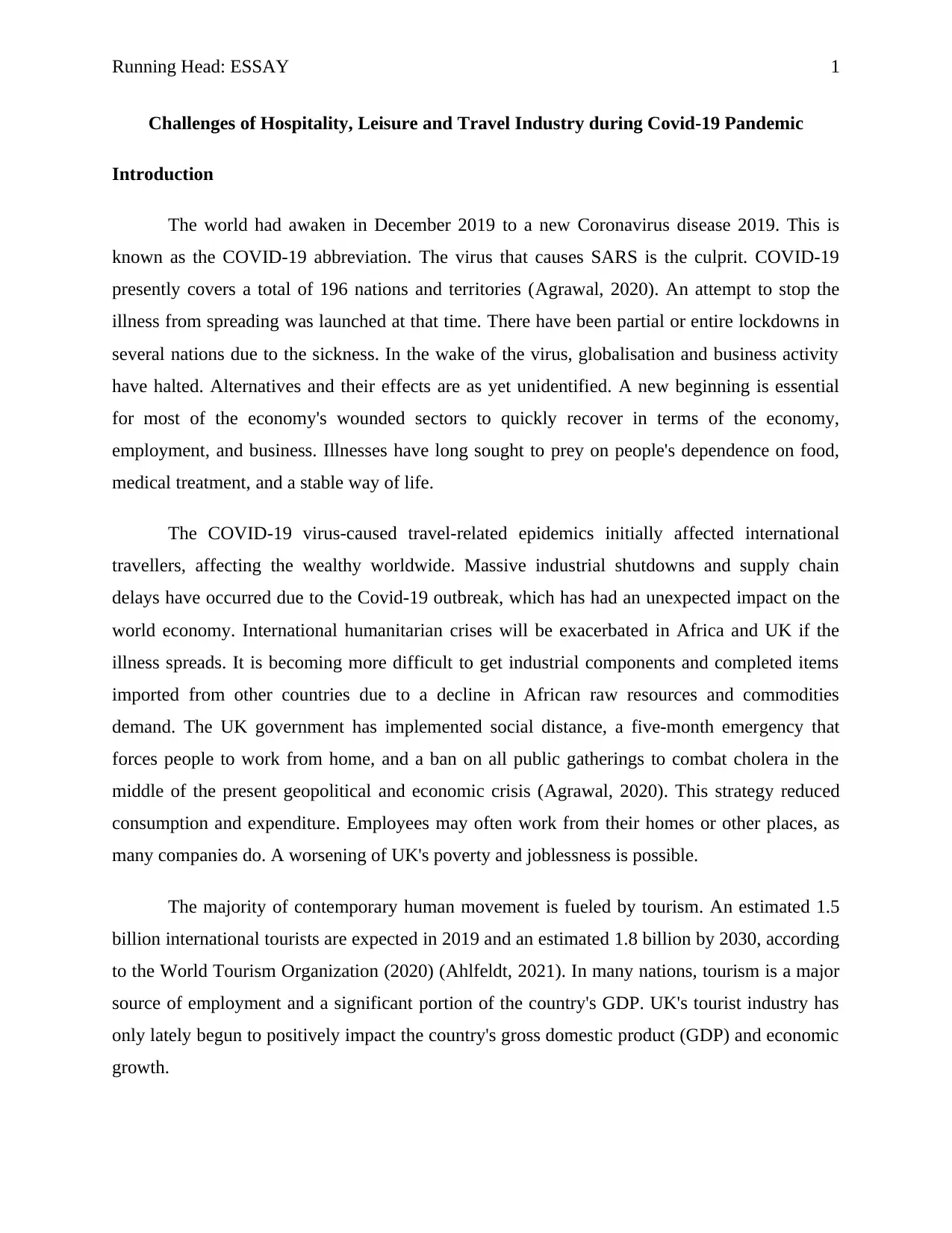
Running Head: ESSAY 1
Challenges of Hospitality, Leisure and Travel Industry during Covid-19 Pandemic
Introduction
The world had awaken in December 2019 to a new Coronavirus disease 2019. This is
known as the COVID-19 abbreviation. The virus that causes SARS is the culprit. COVID-19
presently covers a total of 196 nations and territories (Agrawal, 2020). An attempt to stop the
illness from spreading was launched at that time. There have been partial or entire lockdowns in
several nations due to the sickness. In the wake of the virus, globalisation and business activity
have halted. Alternatives and their effects are as yet unidentified. A new beginning is essential
for most of the economy's wounded sectors to quickly recover in terms of the economy,
employment, and business. Illnesses have long sought to prey on people's dependence on food,
medical treatment, and a stable way of life.
The COVID-19 virus-caused travel-related epidemics initially affected international
travellers, affecting the wealthy worldwide. Massive industrial shutdowns and supply chain
delays have occurred due to the Covid-19 outbreak, which has had an unexpected impact on the
world economy. International humanitarian crises will be exacerbated in Africa and UK if the
illness spreads. It is becoming more difficult to get industrial components and completed items
imported from other countries due to a decline in African raw resources and commodities
demand. The UK government has implemented social distance, a five-month emergency that
forces people to work from home, and a ban on all public gatherings to combat cholera in the
middle of the present geopolitical and economic crisis (Agrawal, 2020). This strategy reduced
consumption and expenditure. Employees may often work from their homes or other places, as
many companies do. A worsening of UK's poverty and joblessness is possible.
The majority of contemporary human movement is fueled by tourism. An estimated 1.5
billion international tourists are expected in 2019 and an estimated 1.8 billion by 2030, according
to the World Tourism Organization (2020) (Ahlfeldt, 2021). In many nations, tourism is a major
source of employment and a significant portion of the country's GDP. UK's tourist industry has
only lately begun to positively impact the country's gross domestic product (GDP) and economic
growth.
Challenges of Hospitality, Leisure and Travel Industry during Covid-19 Pandemic
Introduction
The world had awaken in December 2019 to a new Coronavirus disease 2019. This is
known as the COVID-19 abbreviation. The virus that causes SARS is the culprit. COVID-19
presently covers a total of 196 nations and territories (Agrawal, 2020). An attempt to stop the
illness from spreading was launched at that time. There have been partial or entire lockdowns in
several nations due to the sickness. In the wake of the virus, globalisation and business activity
have halted. Alternatives and their effects are as yet unidentified. A new beginning is essential
for most of the economy's wounded sectors to quickly recover in terms of the economy,
employment, and business. Illnesses have long sought to prey on people's dependence on food,
medical treatment, and a stable way of life.
The COVID-19 virus-caused travel-related epidemics initially affected international
travellers, affecting the wealthy worldwide. Massive industrial shutdowns and supply chain
delays have occurred due to the Covid-19 outbreak, which has had an unexpected impact on the
world economy. International humanitarian crises will be exacerbated in Africa and UK if the
illness spreads. It is becoming more difficult to get industrial components and completed items
imported from other countries due to a decline in African raw resources and commodities
demand. The UK government has implemented social distance, a five-month emergency that
forces people to work from home, and a ban on all public gatherings to combat cholera in the
middle of the present geopolitical and economic crisis (Agrawal, 2020). This strategy reduced
consumption and expenditure. Employees may often work from their homes or other places, as
many companies do. A worsening of UK's poverty and joblessness is possible.
The majority of contemporary human movement is fueled by tourism. An estimated 1.5
billion international tourists are expected in 2019 and an estimated 1.8 billion by 2030, according
to the World Tourism Organization (2020) (Ahlfeldt, 2021). In many nations, tourism is a major
source of employment and a significant portion of the country's GDP. UK's tourist industry has
only lately begun to positively impact the country's gross domestic product (GDP) and economic
growth.
⊘ This is a preview!⊘
Do you want full access?
Subscribe today to unlock all pages.

Trusted by 1+ million students worldwide
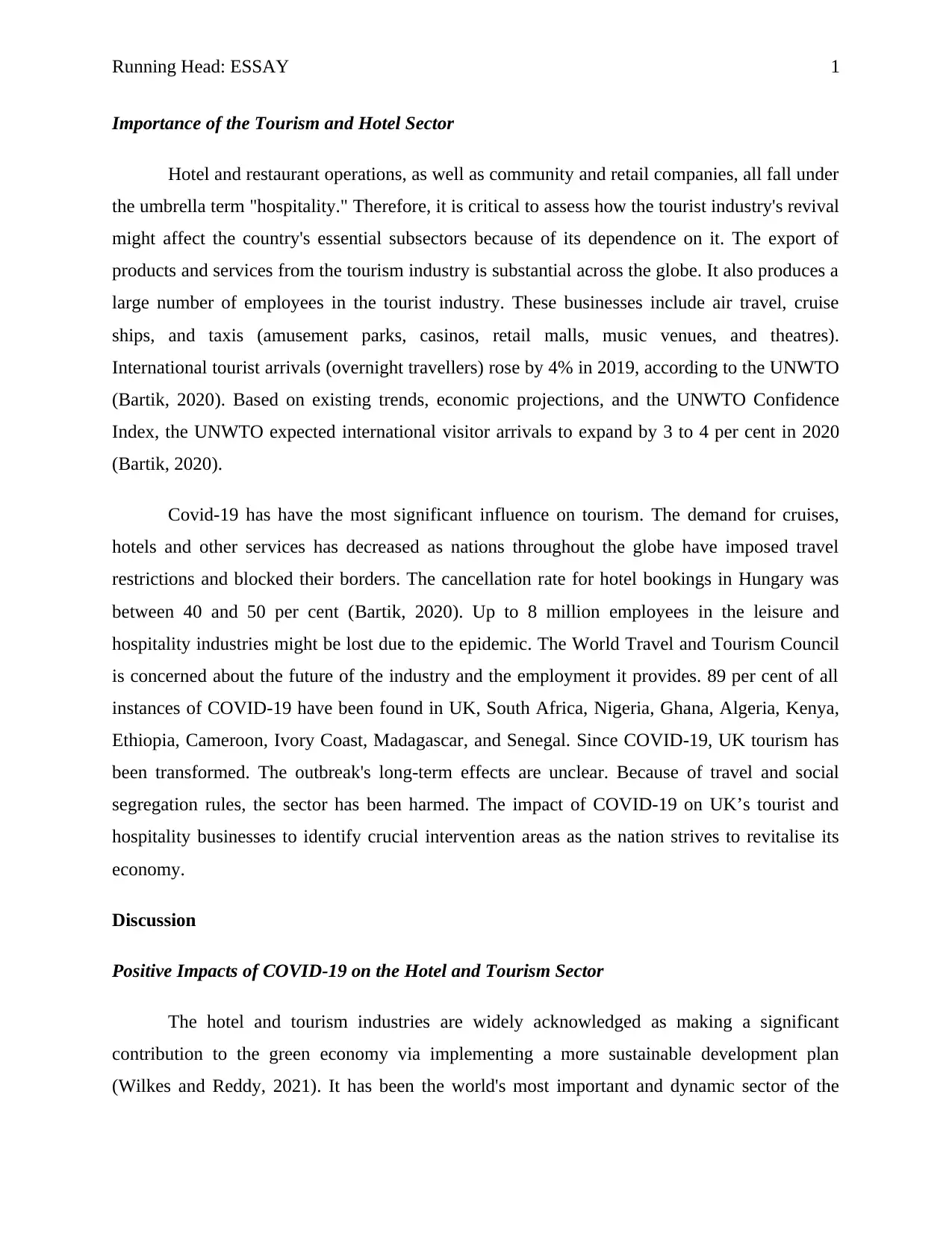
Running Head: ESSAY 1
Importance of the Tourism and Hotel Sector
Hotel and restaurant operations, as well as community and retail companies, all fall under
the umbrella term "hospitality." Therefore, it is critical to assess how the tourist industry's revival
might affect the country's essential subsectors because of its dependence on it. The export of
products and services from the tourism industry is substantial across the globe. It also produces a
large number of employees in the tourist industry. These businesses include air travel, cruise
ships, and taxis (amusement parks, casinos, retail malls, music venues, and theatres).
International tourist arrivals (overnight travellers) rose by 4% in 2019, according to the UNWTO
(Bartik, 2020). Based on existing trends, economic projections, and the UNWTO Confidence
Index, the UNWTO expected international visitor arrivals to expand by 3 to 4 per cent in 2020
(Bartik, 2020).
Covid-19 has have the most significant influence on tourism. The demand for cruises,
hotels and other services has decreased as nations throughout the globe have imposed travel
restrictions and blocked their borders. The cancellation rate for hotel bookings in Hungary was
between 40 and 50 per cent (Bartik, 2020). Up to 8 million employees in the leisure and
hospitality industries might be lost due to the epidemic. The World Travel and Tourism Council
is concerned about the future of the industry and the employment it provides. 89 per cent of all
instances of COVID-19 have been found in UK, South Africa, Nigeria, Ghana, Algeria, Kenya,
Ethiopia, Cameroon, Ivory Coast, Madagascar, and Senegal. Since COVID-19, UK tourism has
been transformed. The outbreak's long-term effects are unclear. Because of travel and social
segregation rules, the sector has been harmed. The impact of COVID-19 on UK’s tourist and
hospitality businesses to identify crucial intervention areas as the nation strives to revitalise its
economy.
Discussion
Positive Impacts of COVID-19 on the Hotel and Tourism Sector
The hotel and tourism industries are widely acknowledged as making a significant
contribution to the green economy via implementing a more sustainable development plan
(Wilkes and Reddy, 2021). It has been the world's most important and dynamic sector of the
Importance of the Tourism and Hotel Sector
Hotel and restaurant operations, as well as community and retail companies, all fall under
the umbrella term "hospitality." Therefore, it is critical to assess how the tourist industry's revival
might affect the country's essential subsectors because of its dependence on it. The export of
products and services from the tourism industry is substantial across the globe. It also produces a
large number of employees in the tourist industry. These businesses include air travel, cruise
ships, and taxis (amusement parks, casinos, retail malls, music venues, and theatres).
International tourist arrivals (overnight travellers) rose by 4% in 2019, according to the UNWTO
(Bartik, 2020). Based on existing trends, economic projections, and the UNWTO Confidence
Index, the UNWTO expected international visitor arrivals to expand by 3 to 4 per cent in 2020
(Bartik, 2020).
Covid-19 has have the most significant influence on tourism. The demand for cruises,
hotels and other services has decreased as nations throughout the globe have imposed travel
restrictions and blocked their borders. The cancellation rate for hotel bookings in Hungary was
between 40 and 50 per cent (Bartik, 2020). Up to 8 million employees in the leisure and
hospitality industries might be lost due to the epidemic. The World Travel and Tourism Council
is concerned about the future of the industry and the employment it provides. 89 per cent of all
instances of COVID-19 have been found in UK, South Africa, Nigeria, Ghana, Algeria, Kenya,
Ethiopia, Cameroon, Ivory Coast, Madagascar, and Senegal. Since COVID-19, UK tourism has
been transformed. The outbreak's long-term effects are unclear. Because of travel and social
segregation rules, the sector has been harmed. The impact of COVID-19 on UK’s tourist and
hospitality businesses to identify crucial intervention areas as the nation strives to revitalise its
economy.
Discussion
Positive Impacts of COVID-19 on the Hotel and Tourism Sector
The hotel and tourism industries are widely acknowledged as making a significant
contribution to the green economy via implementing a more sustainable development plan
(Wilkes and Reddy, 2021). It has been the world's most important and dynamic sector of the
Paraphrase This Document
Need a fresh take? Get an instant paraphrase of this document with our AI Paraphraser
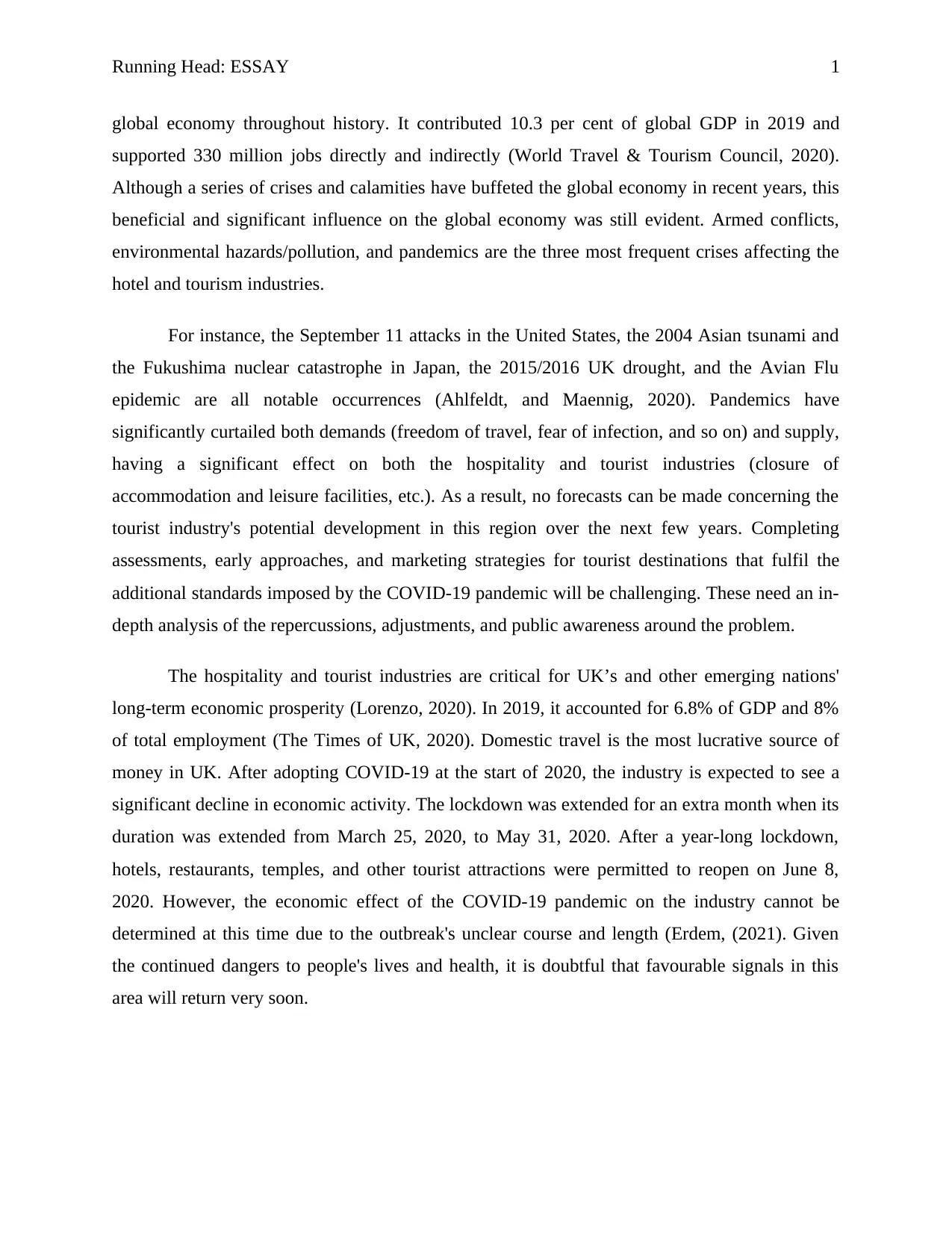
Running Head: ESSAY 1
global economy throughout history. It contributed 10.3 per cent of global GDP in 2019 and
supported 330 million jobs directly and indirectly (World Travel & Tourism Council, 2020).
Although a series of crises and calamities have buffeted the global economy in recent years, this
beneficial and significant influence on the global economy was still evident. Armed conflicts,
environmental hazards/pollution, and pandemics are the three most frequent crises affecting the
hotel and tourism industries.
For instance, the September 11 attacks in the United States, the 2004 Asian tsunami and
the Fukushima nuclear catastrophe in Japan, the 2015/2016 UK drought, and the Avian Flu
epidemic are all notable occurrences (Ahlfeldt, and Maennig, 2020). Pandemics have
significantly curtailed both demands (freedom of travel, fear of infection, and so on) and supply,
having a significant effect on both the hospitality and tourist industries (closure of
accommodation and leisure facilities, etc.). As a result, no forecasts can be made concerning the
tourist industry's potential development in this region over the next few years. Completing
assessments, early approaches, and marketing strategies for tourist destinations that fulfil the
additional standards imposed by the COVID-19 pandemic will be challenging. These need an in-
depth analysis of the repercussions, adjustments, and public awareness around the problem.
The hospitality and tourist industries are critical for UK’s and other emerging nations'
long-term economic prosperity (Lorenzo, 2020). In 2019, it accounted for 6.8% of GDP and 8%
of total employment (The Times of UK, 2020). Domestic travel is the most lucrative source of
money in UK. After adopting COVID-19 at the start of 2020, the industry is expected to see a
significant decline in economic activity. The lockdown was extended for an extra month when its
duration was extended from March 25, 2020, to May 31, 2020. After a year-long lockdown,
hotels, restaurants, temples, and other tourist attractions were permitted to reopen on June 8,
2020. However, the economic effect of the COVID-19 pandemic on the industry cannot be
determined at this time due to the outbreak's unclear course and length (Erdem, (2021). Given
the continued dangers to people's lives and health, it is doubtful that favourable signals in this
area will return very soon.
global economy throughout history. It contributed 10.3 per cent of global GDP in 2019 and
supported 330 million jobs directly and indirectly (World Travel & Tourism Council, 2020).
Although a series of crises and calamities have buffeted the global economy in recent years, this
beneficial and significant influence on the global economy was still evident. Armed conflicts,
environmental hazards/pollution, and pandemics are the three most frequent crises affecting the
hotel and tourism industries.
For instance, the September 11 attacks in the United States, the 2004 Asian tsunami and
the Fukushima nuclear catastrophe in Japan, the 2015/2016 UK drought, and the Avian Flu
epidemic are all notable occurrences (Ahlfeldt, and Maennig, 2020). Pandemics have
significantly curtailed both demands (freedom of travel, fear of infection, and so on) and supply,
having a significant effect on both the hospitality and tourist industries (closure of
accommodation and leisure facilities, etc.). As a result, no forecasts can be made concerning the
tourist industry's potential development in this region over the next few years. Completing
assessments, early approaches, and marketing strategies for tourist destinations that fulfil the
additional standards imposed by the COVID-19 pandemic will be challenging. These need an in-
depth analysis of the repercussions, adjustments, and public awareness around the problem.
The hospitality and tourist industries are critical for UK’s and other emerging nations'
long-term economic prosperity (Lorenzo, 2020). In 2019, it accounted for 6.8% of GDP and 8%
of total employment (The Times of UK, 2020). Domestic travel is the most lucrative source of
money in UK. After adopting COVID-19 at the start of 2020, the industry is expected to see a
significant decline in economic activity. The lockdown was extended for an extra month when its
duration was extended from March 25, 2020, to May 31, 2020. After a year-long lockdown,
hotels, restaurants, temples, and other tourist attractions were permitted to reopen on June 8,
2020. However, the economic effect of the COVID-19 pandemic on the industry cannot be
determined at this time due to the outbreak's unclear course and length (Erdem, (2021). Given
the continued dangers to people's lives and health, it is doubtful that favourable signals in this
area will return very soon.
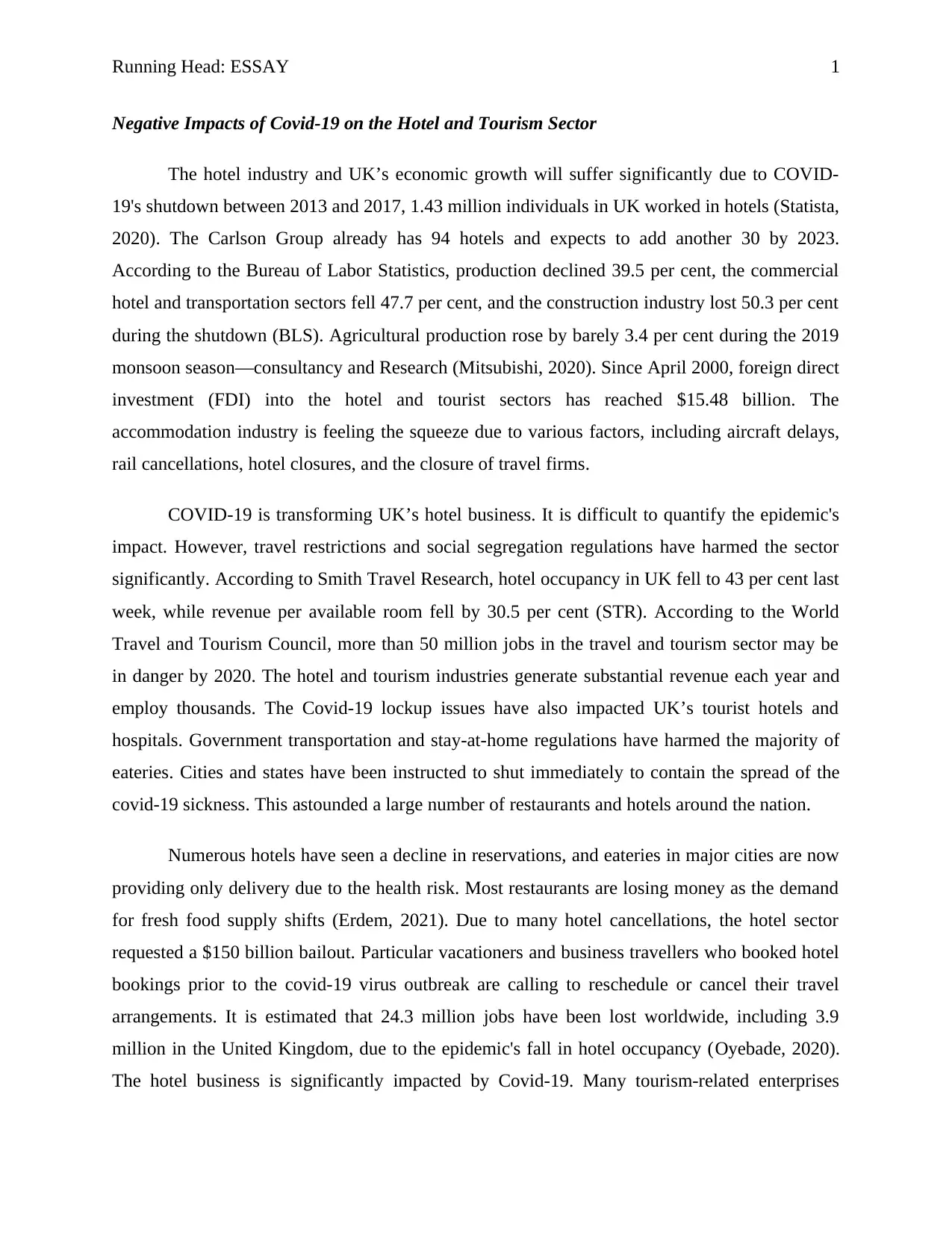
Running Head: ESSAY 1
Negative Impacts of Covid-19 on the Hotel and Tourism Sector
The hotel industry and UK’s economic growth will suffer significantly due to COVID-
19's shutdown between 2013 and 2017, 1.43 million individuals in UK worked in hotels (Statista,
2020). The Carlson Group already has 94 hotels and expects to add another 30 by 2023.
According to the Bureau of Labor Statistics, production declined 39.5 per cent, the commercial
hotel and transportation sectors fell 47.7 per cent, and the construction industry lost 50.3 per cent
during the shutdown (BLS). Agricultural production rose by barely 3.4 per cent during the 2019
monsoon season—consultancy and Research (Mitsubishi, 2020). Since April 2000, foreign direct
investment (FDI) into the hotel and tourist sectors has reached $15.48 billion. The
accommodation industry is feeling the squeeze due to various factors, including aircraft delays,
rail cancellations, hotel closures, and the closure of travel firms.
COVID-19 is transforming UK’s hotel business. It is difficult to quantify the epidemic's
impact. However, travel restrictions and social segregation regulations have harmed the sector
significantly. According to Smith Travel Research, hotel occupancy in UK fell to 43 per cent last
week, while revenue per available room fell by 30.5 per cent (STR). According to the World
Travel and Tourism Council, more than 50 million jobs in the travel and tourism sector may be
in danger by 2020. The hotel and tourism industries generate substantial revenue each year and
employ thousands. The Covid-19 lockup issues have also impacted UK’s tourist hotels and
hospitals. Government transportation and stay-at-home regulations have harmed the majority of
eateries. Cities and states have been instructed to shut immediately to contain the spread of the
covid-19 sickness. This astounded a large number of restaurants and hotels around the nation.
Numerous hotels have seen a decline in reservations, and eateries in major cities are now
providing only delivery due to the health risk. Most restaurants are losing money as the demand
for fresh food supply shifts (Erdem, 2021). Due to many hotel cancellations, the hotel sector
requested a $150 billion bailout. Particular vacationers and business travellers who booked hotel
bookings prior to the covid-19 virus outbreak are calling to reschedule or cancel their travel
arrangements. It is estimated that 24.3 million jobs have been lost worldwide, including 3.9
million in the United Kingdom, due to the epidemic's fall in hotel occupancy (Oyebade, 2020).
The hotel business is significantly impacted by Covid-19. Many tourism-related enterprises
Negative Impacts of Covid-19 on the Hotel and Tourism Sector
The hotel industry and UK’s economic growth will suffer significantly due to COVID-
19's shutdown between 2013 and 2017, 1.43 million individuals in UK worked in hotels (Statista,
2020). The Carlson Group already has 94 hotels and expects to add another 30 by 2023.
According to the Bureau of Labor Statistics, production declined 39.5 per cent, the commercial
hotel and transportation sectors fell 47.7 per cent, and the construction industry lost 50.3 per cent
during the shutdown (BLS). Agricultural production rose by barely 3.4 per cent during the 2019
monsoon season—consultancy and Research (Mitsubishi, 2020). Since April 2000, foreign direct
investment (FDI) into the hotel and tourist sectors has reached $15.48 billion. The
accommodation industry is feeling the squeeze due to various factors, including aircraft delays,
rail cancellations, hotel closures, and the closure of travel firms.
COVID-19 is transforming UK’s hotel business. It is difficult to quantify the epidemic's
impact. However, travel restrictions and social segregation regulations have harmed the sector
significantly. According to Smith Travel Research, hotel occupancy in UK fell to 43 per cent last
week, while revenue per available room fell by 30.5 per cent (STR). According to the World
Travel and Tourism Council, more than 50 million jobs in the travel and tourism sector may be
in danger by 2020. The hotel and tourism industries generate substantial revenue each year and
employ thousands. The Covid-19 lockup issues have also impacted UK’s tourist hotels and
hospitals. Government transportation and stay-at-home regulations have harmed the majority of
eateries. Cities and states have been instructed to shut immediately to contain the spread of the
covid-19 sickness. This astounded a large number of restaurants and hotels around the nation.
Numerous hotels have seen a decline in reservations, and eateries in major cities are now
providing only delivery due to the health risk. Most restaurants are losing money as the demand
for fresh food supply shifts (Erdem, 2021). Due to many hotel cancellations, the hotel sector
requested a $150 billion bailout. Particular vacationers and business travellers who booked hotel
bookings prior to the covid-19 virus outbreak are calling to reschedule or cancel their travel
arrangements. It is estimated that 24.3 million jobs have been lost worldwide, including 3.9
million in the United Kingdom, due to the epidemic's fall in hotel occupancy (Oyebade, 2020).
The hotel business is significantly impacted by Covid-19. Many tourism-related enterprises
⊘ This is a preview!⊘
Do you want full access?
Subscribe today to unlock all pages.

Trusted by 1+ million students worldwide
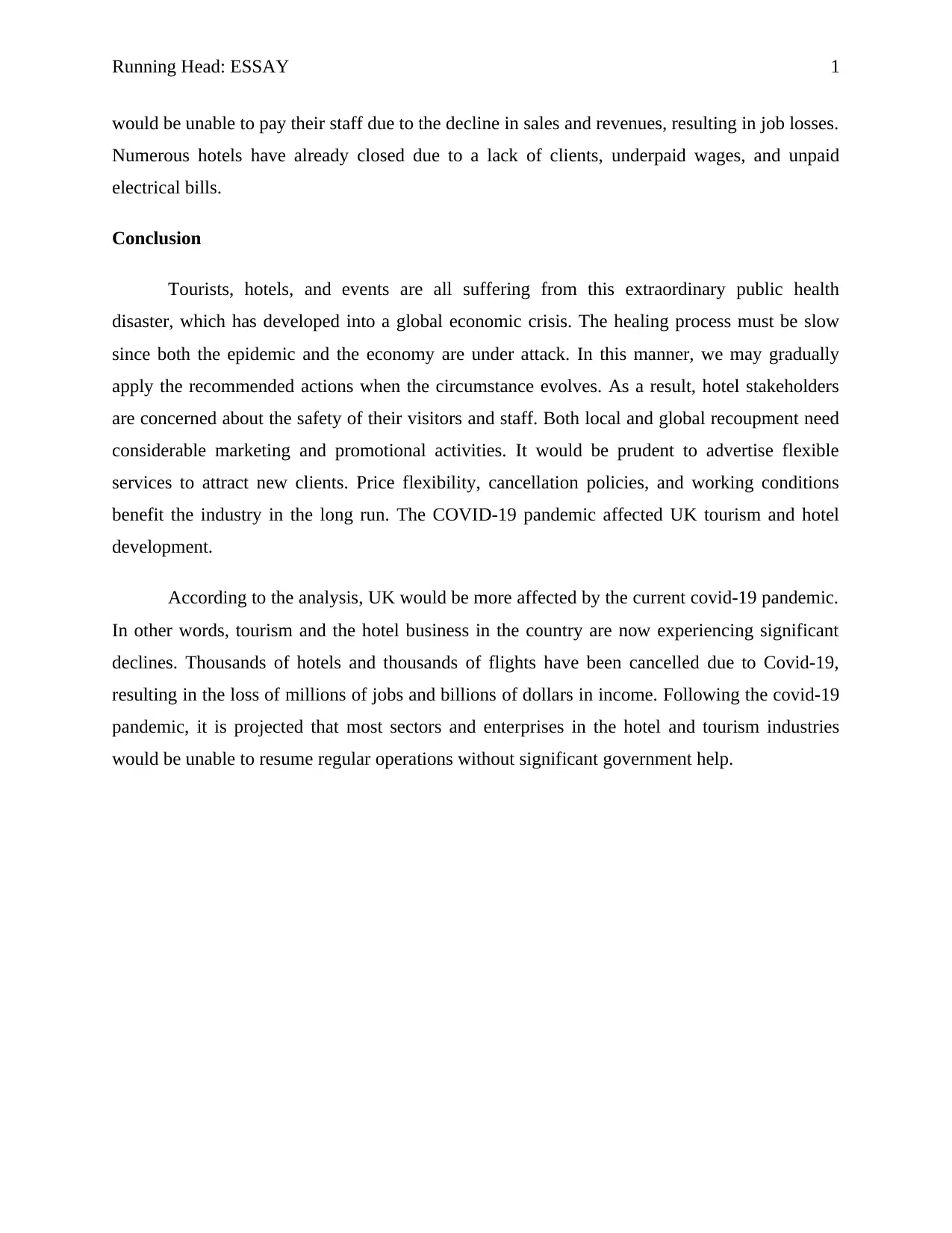
Running Head: ESSAY 1
would be unable to pay their staff due to the decline in sales and revenues, resulting in job losses.
Numerous hotels have already closed due to a lack of clients, underpaid wages, and unpaid
electrical bills.
Conclusion
Tourists, hotels, and events are all suffering from this extraordinary public health
disaster, which has developed into a global economic crisis. The healing process must be slow
since both the epidemic and the economy are under attack. In this manner, we may gradually
apply the recommended actions when the circumstance evolves. As a result, hotel stakeholders
are concerned about the safety of their visitors and staff. Both local and global recoupment need
considerable marketing and promotional activities. It would be prudent to advertise flexible
services to attract new clients. Price flexibility, cancellation policies, and working conditions
benefit the industry in the long run. The COVID-19 pandemic affected UK tourism and hotel
development.
According to the analysis, UK would be more affected by the current covid-19 pandemic.
In other words, tourism and the hotel business in the country are now experiencing significant
declines. Thousands of hotels and thousands of flights have been cancelled due to Covid-19,
resulting in the loss of millions of jobs and billions of dollars in income. Following the covid-19
pandemic, it is projected that most sectors and enterprises in the hotel and tourism industries
would be unable to resume regular operations without significant government help.
would be unable to pay their staff due to the decline in sales and revenues, resulting in job losses.
Numerous hotels have already closed due to a lack of clients, underpaid wages, and unpaid
electrical bills.
Conclusion
Tourists, hotels, and events are all suffering from this extraordinary public health
disaster, which has developed into a global economic crisis. The healing process must be slow
since both the epidemic and the economy are under attack. In this manner, we may gradually
apply the recommended actions when the circumstance evolves. As a result, hotel stakeholders
are concerned about the safety of their visitors and staff. Both local and global recoupment need
considerable marketing and promotional activities. It would be prudent to advertise flexible
services to attract new clients. Price flexibility, cancellation policies, and working conditions
benefit the industry in the long run. The COVID-19 pandemic affected UK tourism and hotel
development.
According to the analysis, UK would be more affected by the current covid-19 pandemic.
In other words, tourism and the hotel business in the country are now experiencing significant
declines. Thousands of hotels and thousands of flights have been cancelled due to Covid-19,
resulting in the loss of millions of jobs and billions of dollars in income. Following the covid-19
pandemic, it is projected that most sectors and enterprises in the hotel and tourism industries
would be unable to resume regular operations without significant government help.
Paraphrase This Document
Need a fresh take? Get an instant paraphrase of this document with our AI Paraphraser
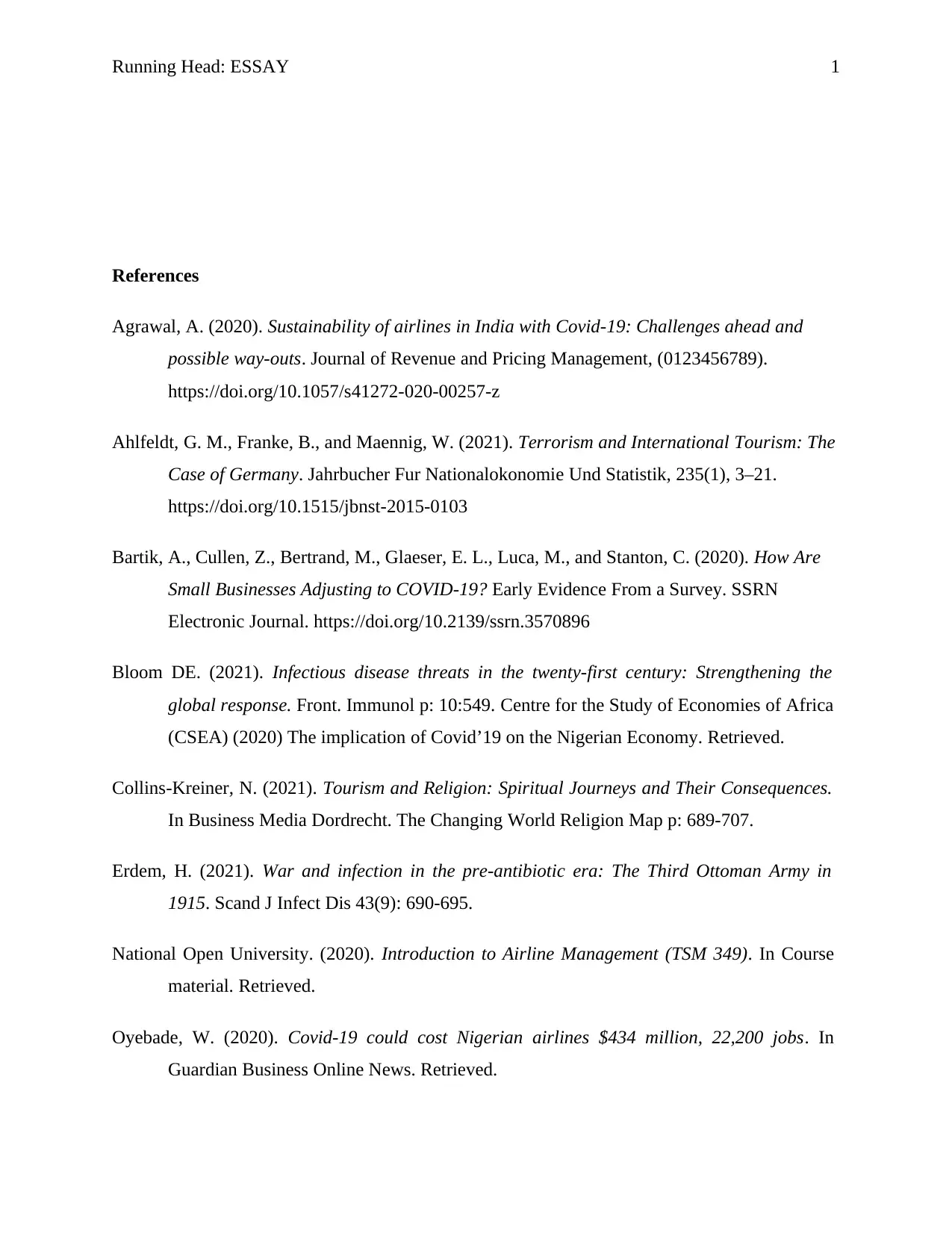
Running Head: ESSAY 1
References
Agrawal, A. (2020). Sustainability of airlines in India with Covid-19: Challenges ahead and
possible way-outs. Journal of Revenue and Pricing Management, (0123456789).
https://doi.org/10.1057/s41272-020-00257-z
Ahlfeldt, G. M., Franke, B., and Maennig, W. (2021). Terrorism and International Tourism: The
Case of Germany. Jahrbucher Fur Nationalokonomie Und Statistik, 235(1), 3–21.
https://doi.org/10.1515/jbnst-2015-0103
Bartik, A., Cullen, Z., Bertrand, M., Glaeser, E. L., Luca, M., and Stanton, C. (2020). How Are
Small Businesses Adjusting to COVID-19? Early Evidence From a Survey. SSRN
Electronic Journal. https://doi.org/10.2139/ssrn.3570896
Bloom DE. (2021). Infectious disease threats in the twenty-first century: Strengthening the
global response. Front. Immunol p: 10:549. Centre for the Study of Economies of Africa
(CSEA) (2020) The implication of Covid’19 on the Nigerian Economy. Retrieved.
Collins-Kreiner, N. (2021). Tourism and Religion: Spiritual Journeys and Their Consequences.
In Business Media Dordrecht. The Changing World Religion Map p: 689-707.
Erdem, H. (2021). War and infection in the pre-antibiotic era: The Third Ottoman Army in
1915. Scand J Infect Dis 43(9): 690-695.
National Open University. (2020). Introduction to Airline Management (TSM 349). In Course
material. Retrieved.
Oyebade, W. (2020). Covid-19 could cost Nigerian airlines $434 million, 22,200 jobs. In
Guardian Business Online News. Retrieved.
References
Agrawal, A. (2020). Sustainability of airlines in India with Covid-19: Challenges ahead and
possible way-outs. Journal of Revenue and Pricing Management, (0123456789).
https://doi.org/10.1057/s41272-020-00257-z
Ahlfeldt, G. M., Franke, B., and Maennig, W. (2021). Terrorism and International Tourism: The
Case of Germany. Jahrbucher Fur Nationalokonomie Und Statistik, 235(1), 3–21.
https://doi.org/10.1515/jbnst-2015-0103
Bartik, A., Cullen, Z., Bertrand, M., Glaeser, E. L., Luca, M., and Stanton, C. (2020). How Are
Small Businesses Adjusting to COVID-19? Early Evidence From a Survey. SSRN
Electronic Journal. https://doi.org/10.2139/ssrn.3570896
Bloom DE. (2021). Infectious disease threats in the twenty-first century: Strengthening the
global response. Front. Immunol p: 10:549. Centre for the Study of Economies of Africa
(CSEA) (2020) The implication of Covid’19 on the Nigerian Economy. Retrieved.
Collins-Kreiner, N. (2021). Tourism and Religion: Spiritual Journeys and Their Consequences.
In Business Media Dordrecht. The Changing World Religion Map p: 689-707.
Erdem, H. (2021). War and infection in the pre-antibiotic era: The Third Ottoman Army in
1915. Scand J Infect Dis 43(9): 690-695.
National Open University. (2020). Introduction to Airline Management (TSM 349). In Course
material. Retrieved.
Oyebade, W. (2020). Covid-19 could cost Nigerian airlines $434 million, 22,200 jobs. In
Guardian Business Online News. Retrieved.
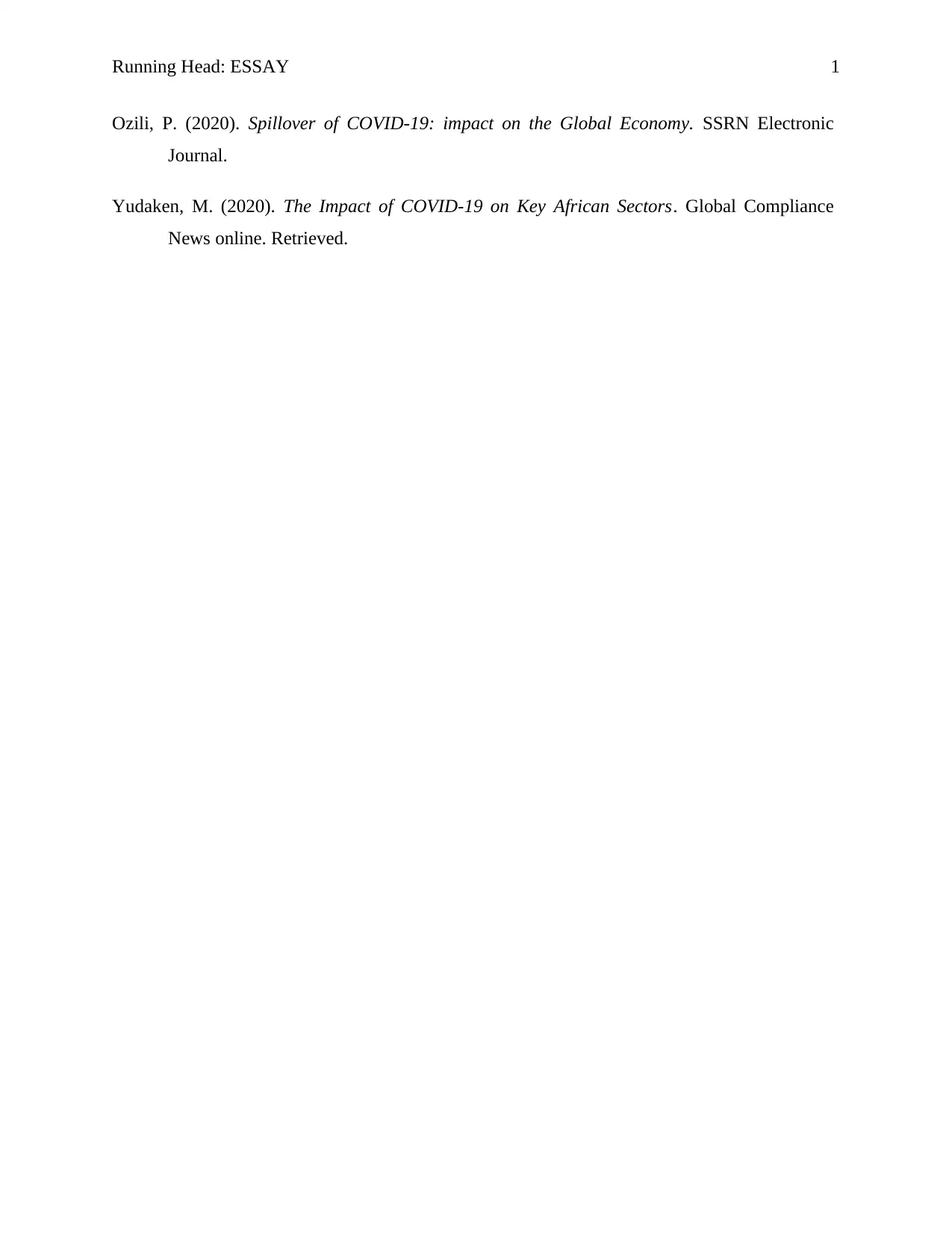
Running Head: ESSAY 1
Ozili, P. (2020). Spillover of COVID-19: impact on the Global Economy. SSRN Electronic
Journal.
Yudaken, M. (2020). The Impact of COVID-19 on Key African Sectors. Global Compliance
News online. Retrieved.
Ozili, P. (2020). Spillover of COVID-19: impact on the Global Economy. SSRN Electronic
Journal.
Yudaken, M. (2020). The Impact of COVID-19 on Key African Sectors. Global Compliance
News online. Retrieved.
⊘ This is a preview!⊘
Do you want full access?
Subscribe today to unlock all pages.

Trusted by 1+ million students worldwide
1 out of 9
Related Documents
Your All-in-One AI-Powered Toolkit for Academic Success.
+13062052269
info@desklib.com
Available 24*7 on WhatsApp / Email
![[object Object]](/_next/static/media/star-bottom.7253800d.svg)
Unlock your academic potential
Copyright © 2020–2026 A2Z Services. All Rights Reserved. Developed and managed by ZUCOL.


